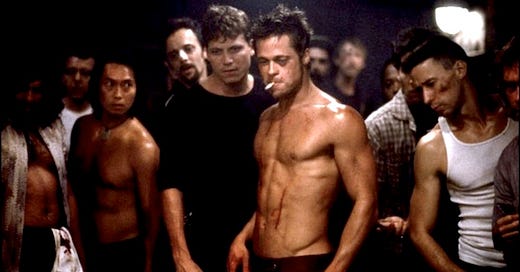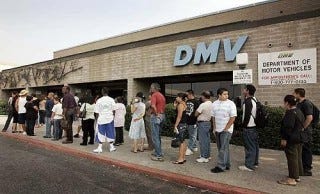Making sense of the DMV experience
How multicultural bureaucracy works under one-party rule in California. Also Brad Pitt.
I backed into a spot where I could watch both entrances of the Papa John’s Pizza parking lot, punctual for my rendezvous. To be safe, I had first taken a slow cruise through the lot, on the lookout for the telltale signs of an unmarked police car. I was here to meet someone I knew only as Smog Lady. I had gotten her phone number from Adam, the night manager at Autozone.
Word on the street was that Smog Lady could get me a smog certificate, and thereby cut the Gordian knot of the California Department of Motor Vehicles bureaucracy.
I grew up in California, moved away in the early 90s, and moved back in 2019. One of the new things I noticed upon my return was small signs stuck to the side of a car, or printed on posterboard and erected on a street corner, advertising “DMV services.” After some intercourse with a few of these, always conducted in halting and heavily accented English, I came to understand that these entrepreneurs are “fixers”, a species that most Americans are unacquainted with. If you want to get something done in the developing world, you often need to engage the services of a fixer. This is someone who has connections in the bureaucracy, often by virtue of kinship. Being a naïve visitor without connections, you couldn’t possibly know whom to bribe, how to approach them, or what forms must be observed. These things must be accomplished with delicacy. You, brainwashed to believe in the Weberian version of bureaucracy as impersonal rationality, are too naive to navigate a real one in most parts of the world. Too European.
They say California is the future. However that may be, the state has become more like the rest of the world, less like the erstwhile United States. The old European ways are anomalous, and perhaps never made a lot of sense. Or maybe they made sense only within a framework provided by something like Calvinism, Prussian organization, ecclesiastical administration, or some similarly ascetic institutional morality that is “no respecter of persons.” By contrast, ties of kinship are easy to grasp, more robust, and make sense to more of the world’s peoples as the ground of cooperation, particularly in societies where the clan may be as far as trust extends.
I was very happy to have found my way to Smog Lady. I spotted her twenty minutes after I arrived at the parking lot. She was making her rounds, leaning into cars through the driver’s side window. Finally she approached me: a toothless matron who spoke only Chinese beyond a few key words in English such as “odometer” and “VIN number.” I noticed she had a big wad of cash in her hand. I gave her my $200. She then got in her car and drove out of the parking lot. I had a moment of panic, thinking I had just been ripped off. But sure enough, thirty minutes later she came back with my fraudulent smog certificate.
The Berkeley historian Yuri Slezkine coined the term “service nomads” to name distinct peoples, typically itinerant or diaspora, who perform functions within a society that can only be done by outsiders. That is because these functions, though indispensable, are shady in one way or another and can’t be openly avowed as necessary. Things like usury (that is, providing credit), burying the dead, magic, puppeteering, prostitution, peddling, cobbling, knife sharpening, dispute mediation and all manner of border-crossing and go-between work that allows the principals to negotiate without losing face or being compromised. Every society has such liminal populations (gypsies, Jains, Travelers, the “overseas Chinese,” the Sheikh Mohammedi of eastern Afghanistan) who develop some kind of “transgressor expertise.” They must keep themselves apart, as integration into the bonds of reciprocity and communal honor would make their trade impossible. They are regarded as unclean, and in turn they guard their own purity against contamination by the host population, which could occur by intermarriage or simply by accepting hospitality from them. Dietary restrictions and other taboos of self-segregation serve to keep the boundary intact. They speak their own language, and may pretend not to understand the host language.
At first blush, the providers of DMV services appear to fit Slezkine’s description of “service nomads.” But that concept only makes sense when framed against a surrounding society that is settled and cohesive, with taken-for-granted norms that secure a basic solidarity among the host population. Without such a background of belonging, and therefore communal honor to uphold, there would seem to be no need for a separate population and social type invested in transgressor expertise. California has become a polyglot of unrelated diasporas, opportunity-seekers, guest workers, tech Brahmins and multiple-passport-holding functionaries posted to the Pacific Rim economic zone. It is more like the bar scene in Star Wars than like Tolkien’s Shire. We are all wanderers.
I think Smog Lady is not to be understood as a service nomad, then. Rather, the necessity of her services may be taken as an indication of the direction that state bureaucracy takes under conditions of multiculturalism (think Brazil), particularly in the absence of partisan political competition (think Soviet Union). These two features, multiculturalism and political monopoly, interact in interesting ways.
With the collapse of the Republican Party in California, there soon emerged a political landscape resembling what the Yugoslav Communist official (turned dissident) Milovan Djilas termed the “party-state.” That is to say, there is little meaningful distinction to be made between the government and the Democratic Party. Competition for control of California takes place, not between two rival parties with different political visions and corresponding electorates in a general election, but between aspirants within the Democratic party, under a shared political vision. In practice, this means competition for money from organized interests that fund the activist networks, which in turn translate those interests into various moralisms and thereby shape the vision of the party. The electorate largely drops out of consideration as a constituency.
Read the rest at Unherd. It is a tale of bribery and corruption -- not as a problem, but as the solution to the kind of dysfunction typical of a party-state.
In other news, Geoffrey Shullenberger has just posted a conversation we had at Outsider Theory about “the psychopolitics of masturbation,” the birth of the therapeutic state, the program of ant-fascist social management in America after WWII, a Freudian political therapy devoted to destroying “the ancient mystique of the father” (to use Reich’s phrase), the top-down sexual revolution promoted by officialdom, the structural role of feminism in post-war capitalism, Marxist hatred of the working class, vitalism in America, the uncertain fate of masculinity, Fight Club, BAP, Breaking Bad, the question of what the hell “Archedelia” means, the authoritarianism of institutionalized anti-authoritarianism, the amorphous character of the para-state, the “rule of nobody,” the bureaucratization of every aspect of American life, woke capital as franchisee of the revolutionary state, bare-breasted German protesters, Christopher Lasch, Foucault as reactionary against obligatory therapeutic sex-talk, the Christian view of sexual difference as a gift and of gender as a social construction, but one to take delight in rather than resent and debunk as a “mere” construction, the art and artifice of femininity as revealed by “female impersonators,” Ivan Illich, the interlocked clerisies of wokeness and technocracy that disqualify vernacular practices as well as the common sense that supports them, and much else. It was great fun, as expected. I am embedding the audio here, but do check out Outsider Theory. Geoff hosts some of the most interesting conversations going these days.






Interesting read. I would expect this feature exists in other uniparty states, especially those that have locked arms with California in the environmental compact to reduce emissions (or perhaps it is to push renewables, or both?).
Dear Matthew, could you check to see if there is a subscription I have of your articles? I think I already have. But I can't check anymore. I don't know whether on Substack or the other channel. I have a son studying medicine in one of the most expensive cities in Germany and I already spend so much information money. Thank you Roberto